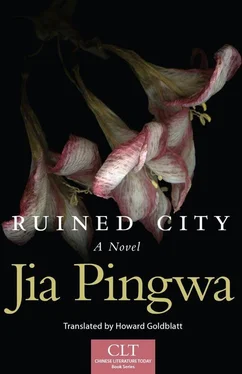“You need to wash your mouth out before telling stories,” Tang Wan’er said.
“All right, then. I’ll try a more refined story,” Meng said. “A hospital admitted a patient with appendicitis and needed to have his pubic hair shaved. An old nurse started shaving, but then a call came for her, so a young nurse took over. When it was done, the two nurses went to wash their hands at the sink, and the old nurse said, ‘The youngsters these days all love tattoos, but this one is weird. He has a tattoo on his thing that says “spring up.’” The young nurse said, ‘No, it says “spring water in the river flows up.’””
No one caught the joke at first, but then Tang punched Meng. Dai Shangtian was totally lost. “What does that mean? Why did one see two words and the other see seven?”
“You’re so dense,” Meng said. “Tang Wan’er knew right off. If it were you and me, there would always be only two words, but if she were there, there would be seven.”
They all laughed. “Now back to the first story,” Zhuang said.
“The added story was free, of course,” Meng continued. “So the woman went to pee and walked back to her place, but it was dark, and all the buildings looked the same, so she opened the door and went straight to bed. But guess what? She had entered the bachelor’s room instead. The bachelor, who was already having trouble sleeping, got worked up when he heard the woman peeing outside. When she climbed into his bed, he knew she was in the wrong house. But he said to himself, Why pass up something good that drops right in your lap . He put his arms around her and began humping. ‘You’re amazing,’ she said. ‘You just did it, and now you can do it again.’ The bachelor said nothing, but was breathing as hard as an old cow, arousing her suspicion. She reached out to touch his head. He was bald. She let out a cry, got out of bed, and walked back to her own place. Her husband asked her if she’d peed a riverful. She sobbed, saying she had done something terrible. He was outraged when he heard her explanation and stormed out of the house. But he walked into the room on the left. Oh, I forgot to tell you that they left their doors open in the summer for ventilation. The occupant of the room to the left was an old man, whom the husband beat the hell out of. End of story.”
“That’s it? What happened next?” Li asked.
“Of course there was a huge to-do, even involving the police,” Meng said. “That prompted the residents in the area to lodge a complaint with the mayor, asking for a solution to their housing problems, or, they said, there would be more stories like this one to bring shame to Xijing. Didn’t you notice how the low-lying areas are under reconstruction?”
“That’s a funny story. You don’t have to drink,” they said.
“All of Meng’s stories involve sex,” Li said. “I’ll tell you one that won’t offend Wan’er. You know that we’ve been long-time residents of Xijing, and that I have lots of uncles on both my mother and father’s sides. These days, networks are all the rage — the mountaintop network, the group network, the alumni network, networks for people from the same area and networks for secretaries. All but the worthless network for relatives serve a useful function. Now that the rural areas are closing in on the city, most of our officeholders have worked their way in from the rural areas, while hardly any of the old residents occupy official municipal positions. There are eighteen families in my clan, with thirty-six children. Half of them have been sent to other counties and can’t come back, while the remaining half are all on society’s bottom rungs. I can’t count on their help, not even to find a child-care center for my kid. And yet I have to go see them with gifts come holiday time. Earlier this year, over New Year’s, I bought a box of snacks and my wife said, ‘With so many relatives, who are you giving that to?’ I told her not to worry. On the first day of the lunar year, I gave it to my maternal uncle. That afternoon, my first maternal aunt sent her kid over with a box of snacks, which I re-gifted to my second maternal aunt, and so on. I was on a virtual carousel, not having a moment’s peace to eat and sleep. You visit relatives to fulfill a responsibility, and you can leave after you hand over your gift. We started back to work on the eighth, didn’t we? Well, that night my wife’s brother-in-law came, the last of my relatives. He left a gift and went home before I came home. When I got back, I thought it looked familiar. The price tag was still on it: three yuan thirty, which was what I had written on it when I bought it. He re-gifted it right back to me. How’s that for a fine piece of reportage?”
“Interesting, but not quite up to snuff. Drink up.” So Li drank. “Not interesting enough for you? All right, I’ll take that. Now I’d like to see what you have to offer.”
It was Dai Shangtian’s turn. “I can’t tell stories,” he began, “so I’ll drink.”
“You’re a book reviewer, which gives you an advantage. You have to tell us a story,” Zhuang said.
“Our housing wasn’t assigned by my workplace. My wife works at a bank, and she gets housing, so I live with her as her dependent. It’s a high-rise, and we live on the tenth floor, which means I’m often out of breath after climbing the stairs. One day I looked for my key but realized I had forgotten to lock the bike, and the key was still in the lock. Oh, I forgot to tell you that I keep the door and bike keys on the same key chain.”
He stopped. They waited for him to continue.
“Go on,” they urged.
“I’m done.”
“You can’t get away with that,” Wan’er said. “We want another one.”
“I often wonder,” Dai said, “why I only deal with four or five people in a large city like Xijing. At home, I’m my parents’ son, my wife’s husband, and my son’s father. Away from home, I’m friends with you and my officemates. So what really belongs to me? The only thing that’s truly mine is my name, and yet I never call myself by that name. It’s always someone else who uses it.”
“Drink up,” Meng said. “That didn’t sound like a story at all.”
“What he said makes me sad,” Zhuang said. “We can’t punish him. Your turn, Dahai.”
“What I’m going to tell you is not really a story, and I can’t verify it, either. I heard it from someone else. You know how many fake goods there are these days, and I’ve always thought that those in power would be spared. But last Sunday my sister told me about an old Xijing official who hosted a banquet for his comrades. To show off his success, he held it at a high-end hotel restaurant. They ordered Maotai, which the hotel manager brought out. They tasted the first bottle; it was a fake. So he brought out another bottle, and it too was a fake, as was the third one. The manager was clearly embarrassed. ‘What’s a hotel like this doing with fake liquor?” the official grumbled before sending his secretary to his house to bring back a bottle of his own Maotai. They opened it, and everyone got a glass. Guess what? It was not only fake; it was just water, tap water.”
“It must have been a bribe,” Meng said. “Maotai is so expensive, no one can afford to give the real thing, but nothing gets done without a gift, hence the fake. Zhao Jingwu told me he did something like that once. Everyone’s heard the story Dahai just told us, and if not, they can imagine it. But this bottle is the real thing, and you have to drink, Dahai.”
“I did say it wasn’t a story,” Dahai said, red-faced. “It’s just a detail you might find useful in your writing.” He took a drink.
“You people didn’t like what I just told you, either, but it contains some gems,” said Li Hongwen. “But I must tell you that I’ve used it in one of my stories, so don’t you use it, Zhidie. You’re so famous that if you copy me, the readers will actually say I copied you.”
Читать дальше


![Matthew Vincent - [you] Ruined It for Everyone!](/books/216429/matthew-vincent-you-ruined-it-for-everyone-thumb.webp)









